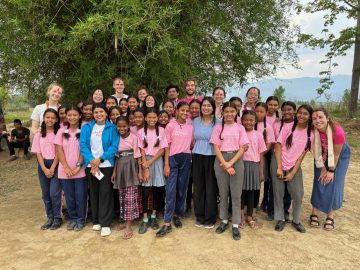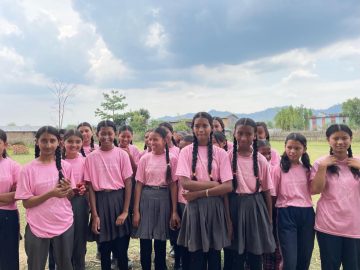
NOTE: THE NEPAL SICKLE CELL DISEASE PROJECT & NEPAL SEXUAL AND REPRODUCTIVE HEALTH PROJECT HAVE BEEN COMBINED TO FORM THE NEPAL HEALTH EDUCATION PARTNERSHIP PROJECT THIS YEAR (2024-2025)
Team Lead (2023/2024): Precilia Kong (precil96@student.ubc.ca)
Location: Dang District, Nepal
Number of positions: 2
Duration of commitment: 2 years
Project website: https://ubcreprohealth.wixsite.com/website
Project social media: https://www.instagram.com/ubcnepal.srh/
Overview
The Nepal Sexual and Reproductive Health Project is a global health initiative (GHI) at the University of British Columbia (UBC) Faculty of Medicine with a focus on health education, health advocacy, and public health.
Since 2015, medical students from the UBC GHI have worked alongside Creating Possibilities (CP) Nepal, a non-profit organization dedicated to enhancing the education and quality of life of structurally disadvantaged women and children in Nepal. We have worked collaboratively to improve health equity and education among the Tharu people, an Indigenous group in the Terai region of Nepal with a history of bonded labour and persistent health inequities. Our partnership with CP Nepal initially began with a focus on sickle cell disease and has since expanded to include adolescent health education.
In 2020, CP Nepal identified sexual and reproductive health (SRH) education as an area of need among Tharu adolescents. Together, we developed the Adolescent Health Program, a SRH curriculum based on the International Technical Guidance on Sexuality Education created by UNESCO. By empowering youth with vital SRH knowledge, our hope is to improve access to and utilization of sexual health services, reduce social stigma, and generate discussion to address inequities in sexual and reproductive health and wellbeing.
Adolescent Health Program
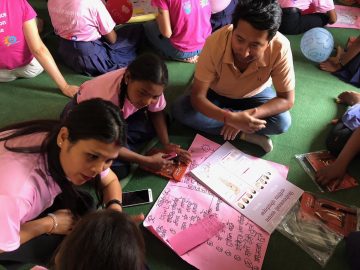 To date, our Adolescent Health Program has enabled over 600 girls from three municipalities in rural Nepal to receive comprehensive SRH education. Taught by local educators, the curriculum covers topics ranging from puberty, menstruation, and reproduction to child marriage and gender equality (see below image). The program has been well-received, with growing interest from local communities and governments requesting further expansion. To support the sustainable delivery of a standardized curriculum, we have created a Training-of-Trainers (ToT) manual of our 10-session program to be used by current and future educators as the program continues to grow. For the 2023/2024 year, we will continue to pilot our ToT manual with new groups of students and further optimize the manual based on feedback from students and educators. CP Nepal has expressed a need for incorporating mental health education into our program, which will be a focus of this year. We have also begun piloting our sessions to include boys, founded on our belief that achieving SRH equity necessitates the involvement of all genders.
To date, our Adolescent Health Program has enabled over 600 girls from three municipalities in rural Nepal to receive comprehensive SRH education. Taught by local educators, the curriculum covers topics ranging from puberty, menstruation, and reproduction to child marriage and gender equality (see below image). The program has been well-received, with growing interest from local communities and governments requesting further expansion. To support the sustainable delivery of a standardized curriculum, we have created a Training-of-Trainers (ToT) manual of our 10-session program to be used by current and future educators as the program continues to grow. For the 2023/2024 year, we will continue to pilot our ToT manual with new groups of students and further optimize the manual based on feedback from students and educators. CP Nepal has expressed a need for incorporating mental health education into our program, which will be a focus of this year. We have also begun piloting our sessions to include boys, founded on our belief that achieving SRH equity necessitates the involvement of all genders.
Table 1. The ten-sessions of the Adolescent Health Program as of 2023
| Session 1
Adolescent Health |
Session 2
Reproductive Health |
Session 3
Menstruation |
Session 4
Pregnancy |
Session 5
Family Planning |
| Session 6
Abortion |
Session 7
Sexually Transmitted Infections |
Session 8
Gender Equality |
Session 9
Consent & Sexual Harassment |
Session 10
Child Marriage |
Research
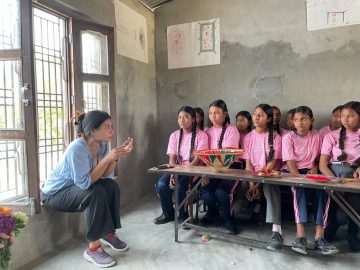 1. Evaluation of the Adolescent Health Program
1. Evaluation of the Adolescent Health Program
We will be conducting a mixed-methods study this year to assess the impact of our Adolescent Health Program. Through the use of pre- and post-program surveys informed by validated tools, we will assess whether the program improves:
- knowledge around SRH topics,
- self-esteem,
- gender-equitable attitudes, and
- use of SRH services.
An application has been submitted and approved by the UBC Behavioural Research Ethics Board.
2. Mental Health Needs Assessment
During our onsite visit in 2023, CP Nepal brought to our attention the need for mental health education within the community. As we visited classrooms, we learned about the escalating rates of suicide and a lack of awareness regarding mental health/illness. Many girls expressed that suicide could be seen as a viable option if they were to experience a pregnancy before marriage, driven by the burden of shame and social discrimination.
As part of our mixed methods study, we will also be performing a mental health needs assessment among participants of the Adolescent Health Program to gain a better understanding of the mental health landscape within the community. Our needs assessment is a 64 item survey, organized in a three-point Likert response scale (1=disagree; 2=neither agree nor disagree; 3=agree) including five sections:
- knowledge about mental health problems including specific knowledge on 5 mental disorders (Major Depressive Disorder, Generalized Anxiety Disorder, Schizophrenia, Substance Use Disorder and Eating Disorders);
- erroneous beliefs/stereotypes;
- first aid skills and help seeking behaviors;
- self-help strategies;
- curriculum delivery.
Ultimately, we hope to incorporate a mental health session into the program and equip Nepali youth with tools to navigate mental health challenges and foster resilience in their communities.
Knowledge Translation & Communications
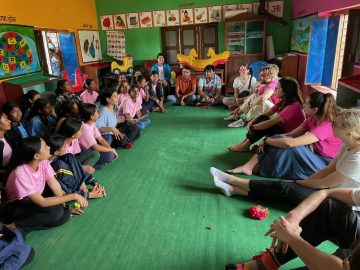 Education is a core component of our project, both within Nepal and in our local communities in Canada. We hope to create a social platform to share the magic of the Adolescent Health Program, feature our incredible Nepali partners, and provide education on key SRH topics. By streamlining medical knowledge and highlighting its practical uses, we hope to share content that can be used by individuals all over the world.
Education is a core component of our project, both within Nepal and in our local communities in Canada. We hope to create a social platform to share the magic of the Adolescent Health Program, feature our incredible Nepali partners, and provide education on key SRH topics. By streamlining medical knowledge and highlighting its practical uses, we hope to share content that can be used by individuals all over the world.
We have had the opportunity to present our project at various global health conferences, including the Canadian Conference on Global Health and the Western Medical Research Conference. There has been great interest in our project, particularly in regards to its development as well as impact. With the initiation of our mixed methods study this year, we hope to provide quantitative and qualitative results highlighting the efficacy of our program. These findings will be used to further optimize our program and may also lay the groundwork for similar initiatives in other countries.
Fundraising & Grants
Funding is crucial to ensure the continual delivery of our Adolescent Health Program.
Historically, our role within fundraising has included grant writing, running local fundraisers, reaching out to potential donors (either individual or corporate), and/or developing fundraiser campaigns such as our recent Everything Starts with Her social media campaign.
We have recently partnered with a local non-profit charity organization, Her International, who has worked closely with CP Nepal to foster educational opportunities through creating scholarships, building classrooms, and supporting bicycle programs. Throughout the 2023-2024 year, we hope to flesh out how this partnership will help support our fundraising goals.
